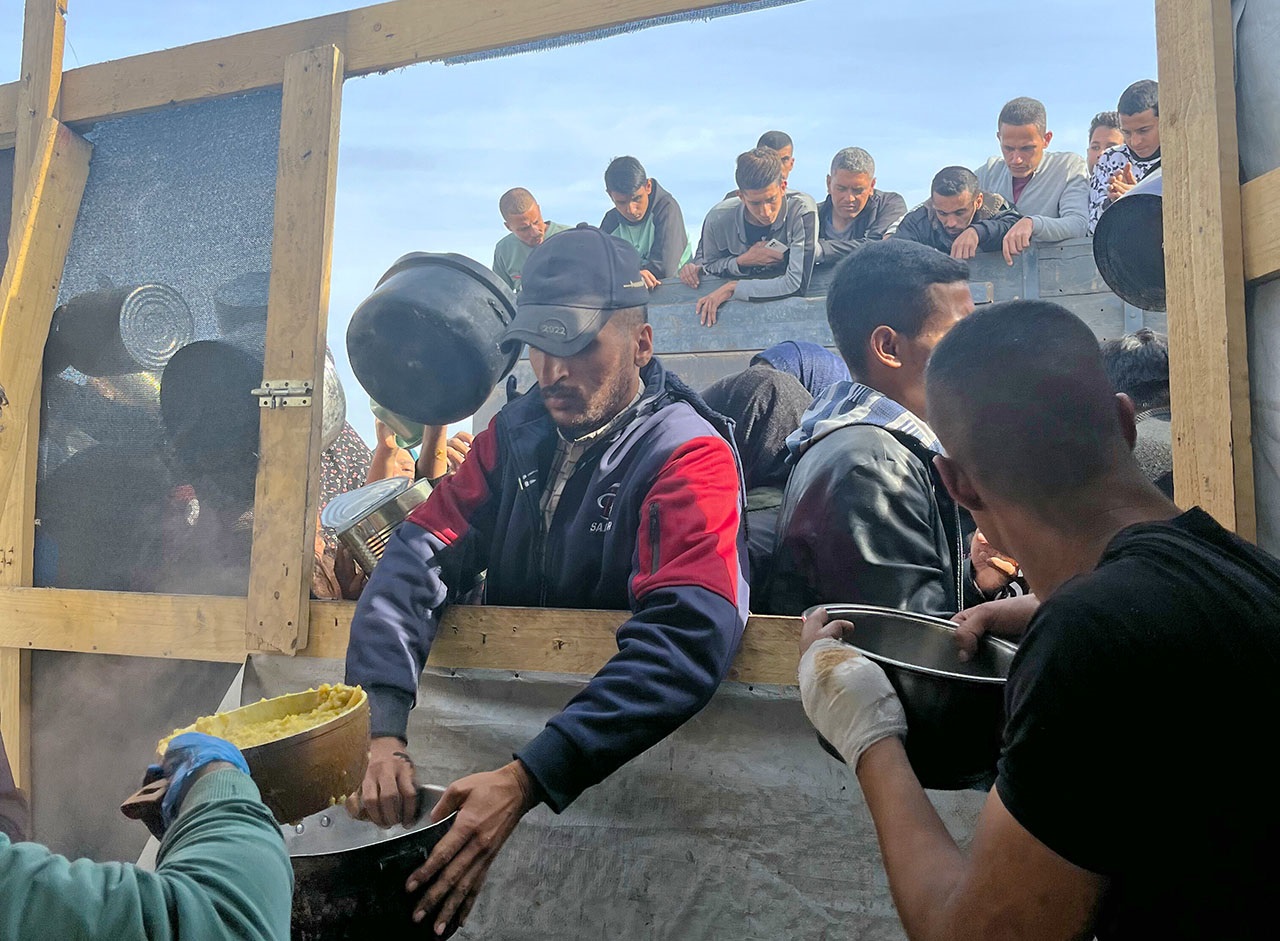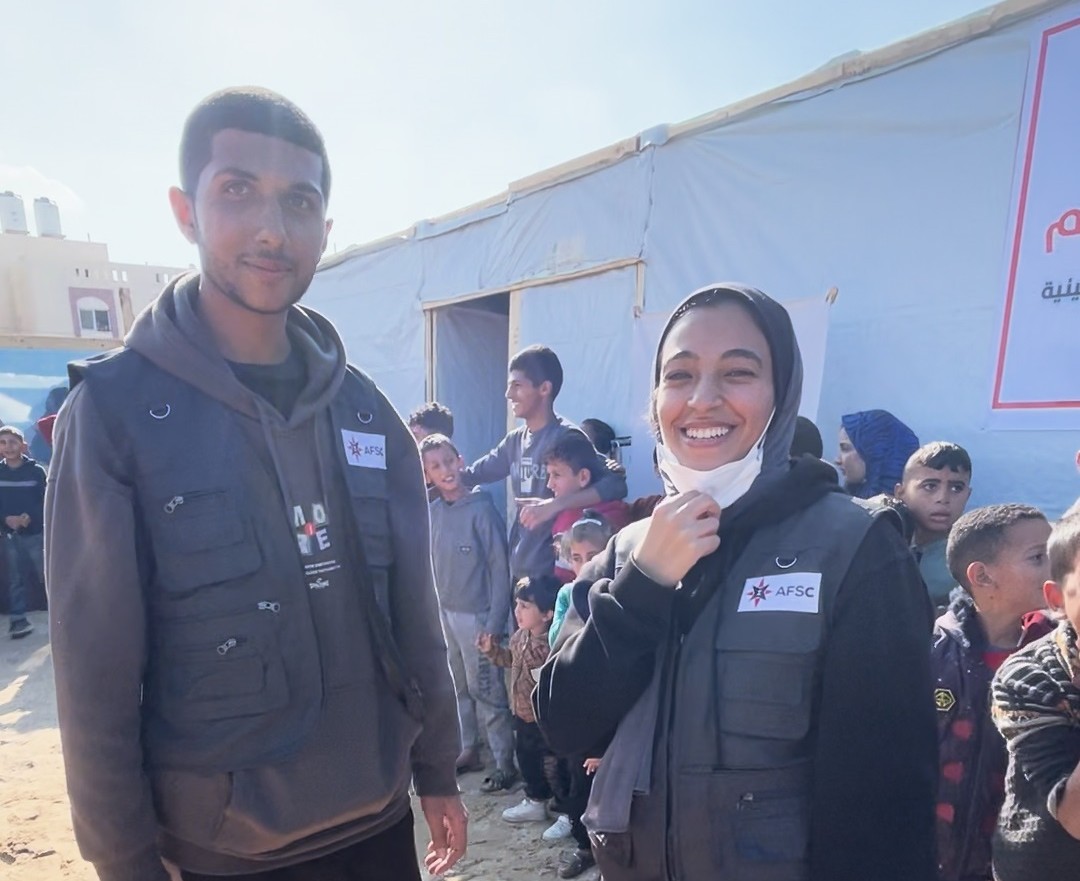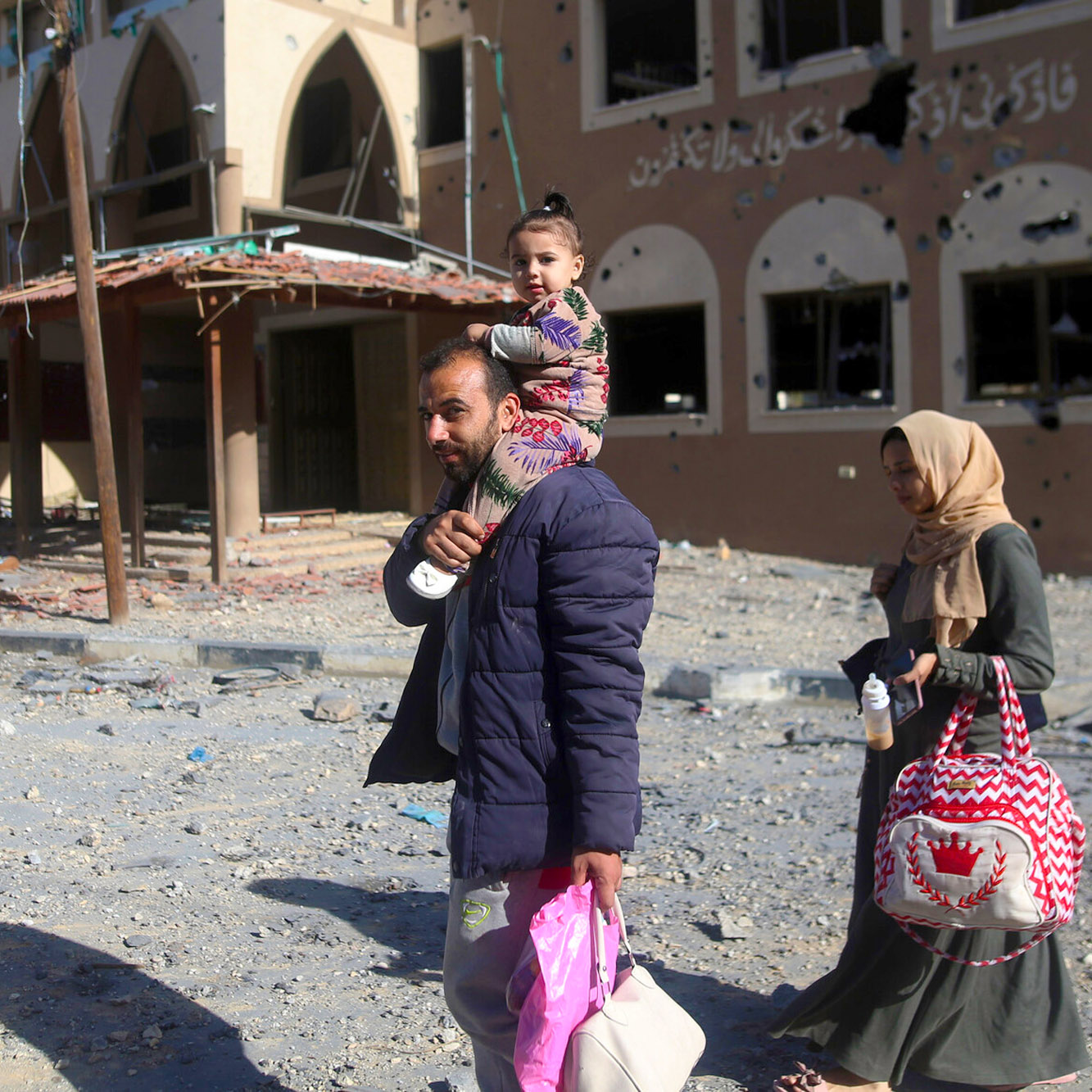
AFSC staff and partners serve food at an open-air kitchen in Rafah. Watch the video to hear more from AFSC's Serena Awad. AFSC/Gaza
Israeli troops are bombing Rafah and are now preparing for a ground invasion. Rafah is the last place in Gaza that has not yet been invaded and is also the key entry and distribution point for humanitarian aid. In a statement from the U.N. Palestinian Rights Committee, the over 1.5 million displaced people in Rafah are now “staring death in the face without access to food, medical care, and safe shelter.” A military incursion “will endanger the lives of countless civilians, many of whom are women and children who have already been displaced multiple times.”
Despite being displaced several times themselves, AFSC staff have distributed aid to more than 250,605 people in Rafah, Deir El-Balah, and Khan Younis. The invasion of Israeli forces will disrupt the lifesaving work of humanitarian organizations, as many in Gaza face death due to starvation and disease.
On Feb. 12, AFSC Program Officer Serena Awad discussed her experience in Rafah and what Palestinians are facing on the ground. Here’s what she had to say:
On how Palestinians in Rafah have responded to news of an invasion
After the Israeli Army started spreading the news about invading the area, many people started to pack their things to leave. They are packing their blankets, their mattresses, everything they have, even trying to undo their tents from the ground and put them on their cars.
There’s no such thing as a safe place for people to go in Gaza. Everyone is confused. If you just walk in the street, you will hear everyone saying, where should we go now? No one has an answer. This is the fifth, seventh, or the tenth time that people have left to move from one place to another.
On what’s happening in other parts of Gaza
In the north of Gaza [where I’m from], people are now dying from hunger. There were many cases that were reported to the World Health Organization and the U.N. Many children are now dead because there is no food.
I have one friend who stayed in the north. The last time I was able to contact her, she said, “I wish I could see some bread. I just want to eat something. We have not eaten for weeks.” I didn't know what to say, and I didn't know what I should tell her.
Bombing also has not stopped in the north of Gaza or the middle area. Most hospitals in the whole Gaza Strip aren’t functioning or are under siege with the Israeli army killing anyone trying to move in or out. So, whoever is injured [often doesn’t survive].
On the medical situation
Medical care is a disaster. In Rafah right now, there is no functioning hospital at all. So, when [bombings happened earlier this week, people brought the wounded to the hospital], finding that it's out of service. They cannot do anything, only give them first aid.
Medication for chronic diseases does not exist. Insulin doesn't exist anymore. People that have diabetes, are suffering right now. Cancer patients, people who have kidney issues, many of them have died.
Many women are giving birth in the worst conditions ever, and I don't know how they will survive. My mother works with the community mental health program as a psychologist and so many patients have relapsed because they don’t have anti-depressants and other medications.
We don’t even have the most simple medications like Tylenol. Because it’s cold, so many people have the flu. We also have so many COVID patients because we’re so crowded. The air is not clean, the tents are not clean, the shelters are not clean.
On the trauma people are facing
We've been through many aggressions before, but it wasn't as harsh as this. The dire humanitarian situation in Gaza is unprecedented. Our everyday has become only about survival. People are just tired. We are so afraid; we just want this to end.
It is hard to handle this amount of blood and destruction. It's like everyone is carrying a mountain above their shoulders. No one knows where to go. No one knows what we should do.

AFSC staff member Serena Awad (right) with volunteer Ahmad at a recreational activity for children in Rafah. AFSC staff
On providing aid to Palestinians
For the past few months, we have been distributing food, water, and hygiene kits. Our open-air kitchen is open every day, serving hot meals. Being part of AFSC’s team working on the ground, next to and with our people, gives me—and them—so much hope. We’re grateful for the unwavering support of the AFSC community in making our efforts possible.
Sometimes we bring food to people who have not eaten in days. The need is so great. We must continue this work. But right now, we may need to pause activities until we know what will happen with the invasion. This is for the safety of the children and families. We don’t want people out there or in a place that is really crowded if there’s an army out there. Once everything is clear, we’ll decide what to do next. Meanwhile we keep going and continue distributing aid.
On the impacts on children and the elderly
We are working with partners on recreational activities for children in schools, shelters, and tents. It's like the most enjoyable activity for children to do because you let them dance, play around and smile. We also distribute toys.
We make them forget about the war for a bit. But at night, when the bombs come again, it sometimes feels like we have done nothing. It’s like you heal them a little and then you need to heal them again tomorrow.
I also think about how this aggression has affected the elderly. Many of them were forced to leave their houses, their cities, and their land over more than 75 years ago [during the Nakba]. Now they are forced to leave their houses again.
On what people in the U.S. can do
We're around 2.3 million Gazans. Every one of us has lost something. What we want to send as a message to people in the U.S. is: Never stop the pressure for a cease-fire. Don’t stop pressuring your communities, your representatives, or your president. Keep pushing for letting in aid to Gaza because it is so important.
Never underestimate what you are doing. Everyone should know that every protest you go to, every donation you make, every word you speak to let people know the truth—that this is an actual genocide that is happening—is saving a life. Just keep doing whatever you can. Please speak up for humanity and call for an end to this genocide.
